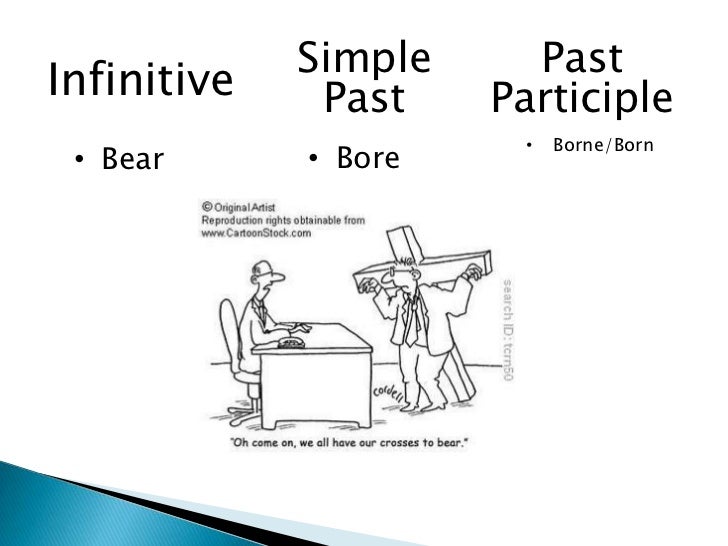
Irregular verbs
"Born" and "borne" differ by more than just that e. Learn about the different meanings of "born" and "borne" and how and when to use each one.
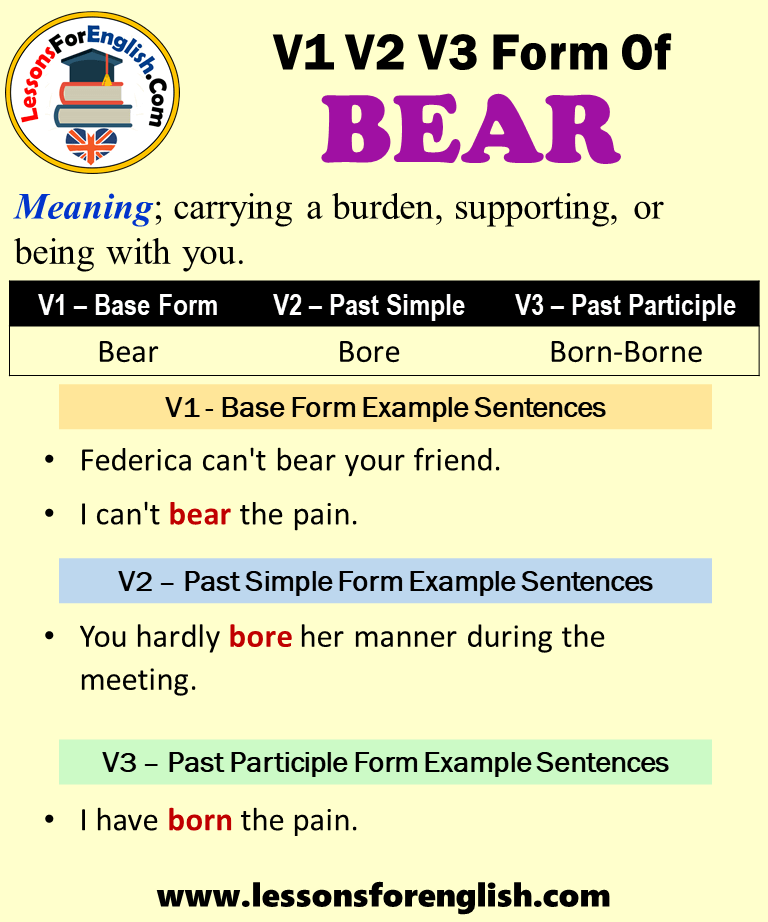
Past Tense Of Bear, Past Participle Form of Bear, Bear Bore Borne V1 V2 V3 Lessons For English
When sorting out the difference between born and borne, one confusing wrinkle is that both words originate from the same source: both are past tense forms of the verb bear.So how are they used differently? Born is the common past-tense form of the verb meaning "to give birth." It is often used in the passive voice: She was born in a log cabin in March of 1817.

Verb Tenses Past Tense, Present Tense & Future Tense with Examples ESL Grammar Verb tenses
The past tense of born is bornt (Geordie) . The third-person singular simple present indicative form of born is borns . The present participle of born is bornin . The past participle of born is bornt (Geordie) . Find more words!

Teaching Verb Tenses Using Timelines Upper Elementary Snapshots
The fact that both born and borne are past tense forms of the verb bear can make it difficult to differentiate between the two. This is because both born and borne originate from the same source, which can lead to confusion.. The past tense of the verb that means "to give birth" is more commonly written as "born." The passive voice.

Irregular verbs in English with a different base form, past simple and past participle English
So Webster's confirms that "born" and "borne" are both born of the same word. When bear means to give birth to, Webster's notes, "the passive past participle in this sense is born when by does not follow.". A baby is born. A passenger is borne. But when followed by the word "by," both take borne. "He was borne by her.".

Born Past Tense, Past Participle, Verb Forms V1 V2 V3 V4 V5
The word "born" is the past participle of the verb "bear," which comes from the Old English word "beran." "Beran" meant to carry or bear a burden, and it was used to describe the physical act of giving birth. Over time, "beran" evolved into "bear," and "born" became the past participle of "bear.".
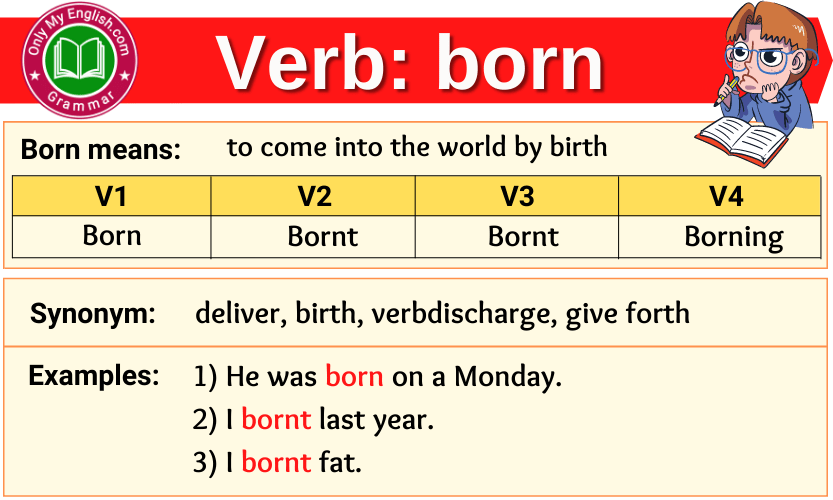
Born Verb Forms Past Tense, Past Participle & V1V2V3 »
Conjugate the English verb borne: indicative, past tense, participle, present perfect, gerund, conjugation models and irregular verbs. Translate borne in context, with examples of use and definition.

Past Continuous Tense Affirmative, Negative, Interrogative English grammar, Learn english
By mastering the past tense of 'bear' and the contexts of 'born vs. borne', you can elevate your English skills and write with confidence and precision. Whether you're crafting an academic essay, drafting a business e-mail, or penning a novel, a solid grasp of English grammar is key.

Verb Tenses How To Use The 12 English Tenses With Useful Tenses Chart
This is a reference page for born verb forms in present, past and participle tenses. Find conjugation of born. Check past tense of born here. website for synonyms, antonyms, verb conjugations and translations

Blog » Page 3 of 3 » EnglishGrammarPage
Borne vs. born. Borne is the past tense and past participle of bear in all senses not related to birth. So it's the appropriate word where bear means to carry —making it the correct spelling in the phrasal verb borne out (e.g., "his prediction was not borne out in reality") and in phrasal adjectives such as food-borne , mosquito-borne.
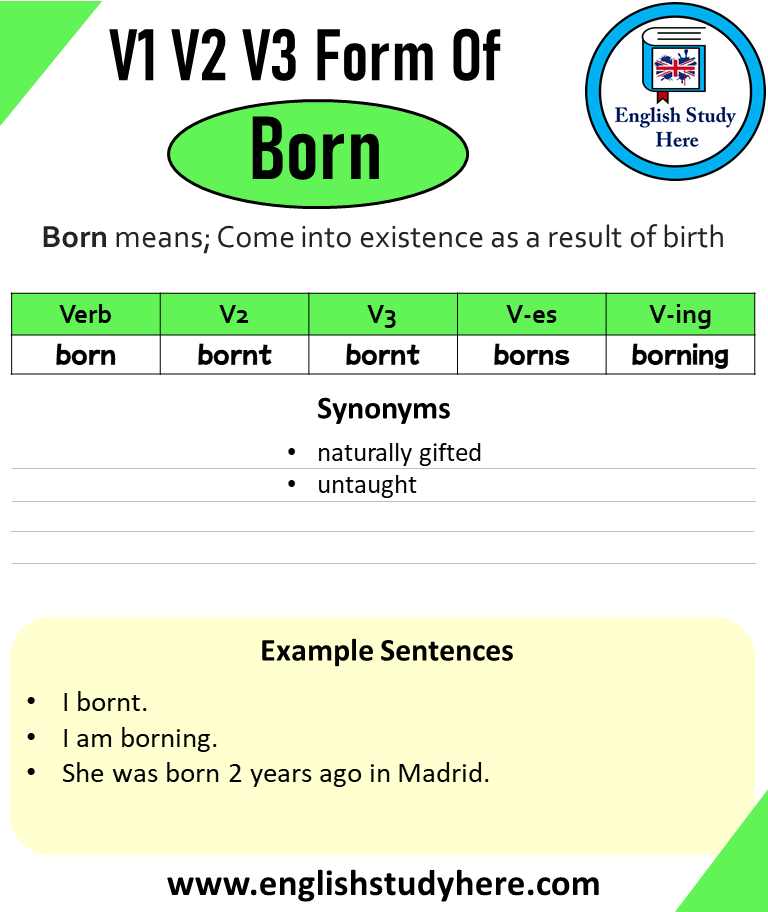
Past Tense of Born, Past Participle of Born, V1 V2 V3 V4 V5 Form of Born English Study Here
The meaning of BORNE is past participle of bear. How to use borne in a sentence. Did you know?. See the full definition Games & Quizzes. At first, borne and born were variant spellings of the same adjective. Used as in water-borne (or water-born), it means "carried by." In the phrase "borne enemies" (or "born enemies"), it means "from.

Past Tense Definition, Rules and Examples of Past Tenses • 7ESL
The past participle of Born is "been born," and the V1 V2 V3 V4 V5 forms are "to be born," "was/were born," "been born," "being born," and "is born/are born.". These forms can be used in different tenses to express different meanings, so it's important to use them correctly.
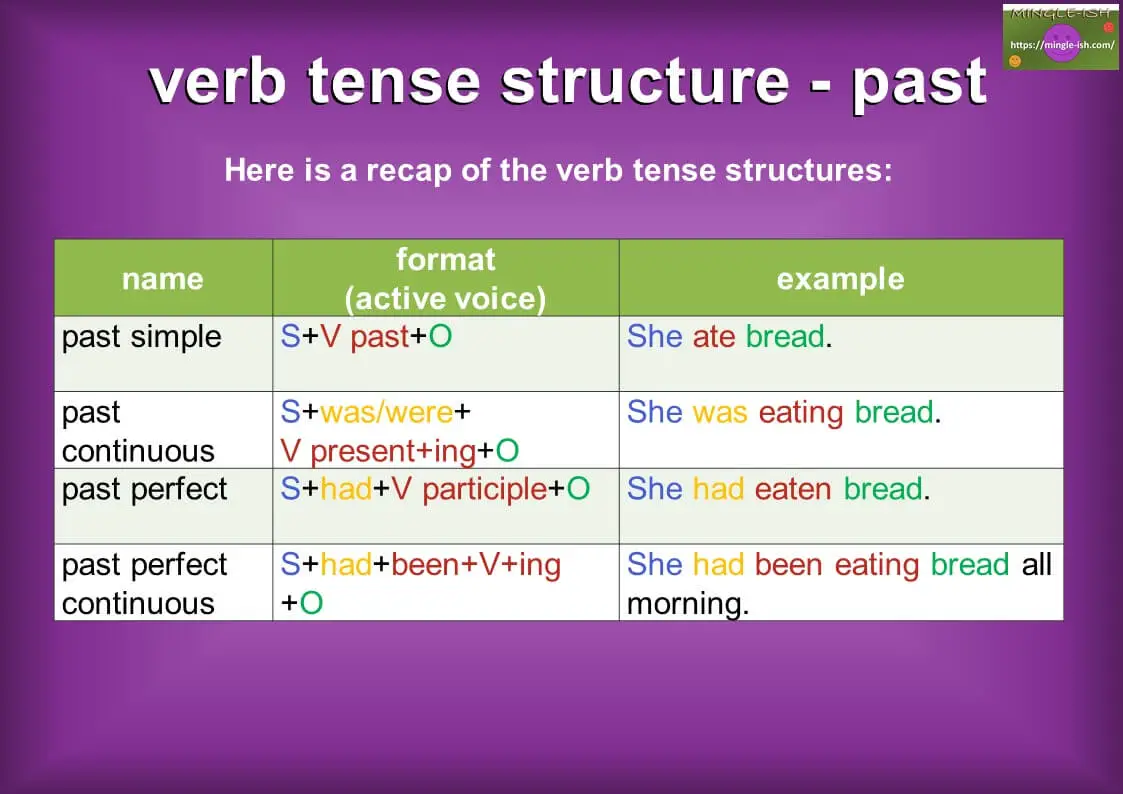
Tense structures in English past, present and future Mingleish
More verb past tense. Break. Bring. Build. Burn. Burst. Bornt is the past tense of the word born. bornt is the past participle of the word born. bornt past form, verb forms, v1v2v3, Infinitive.
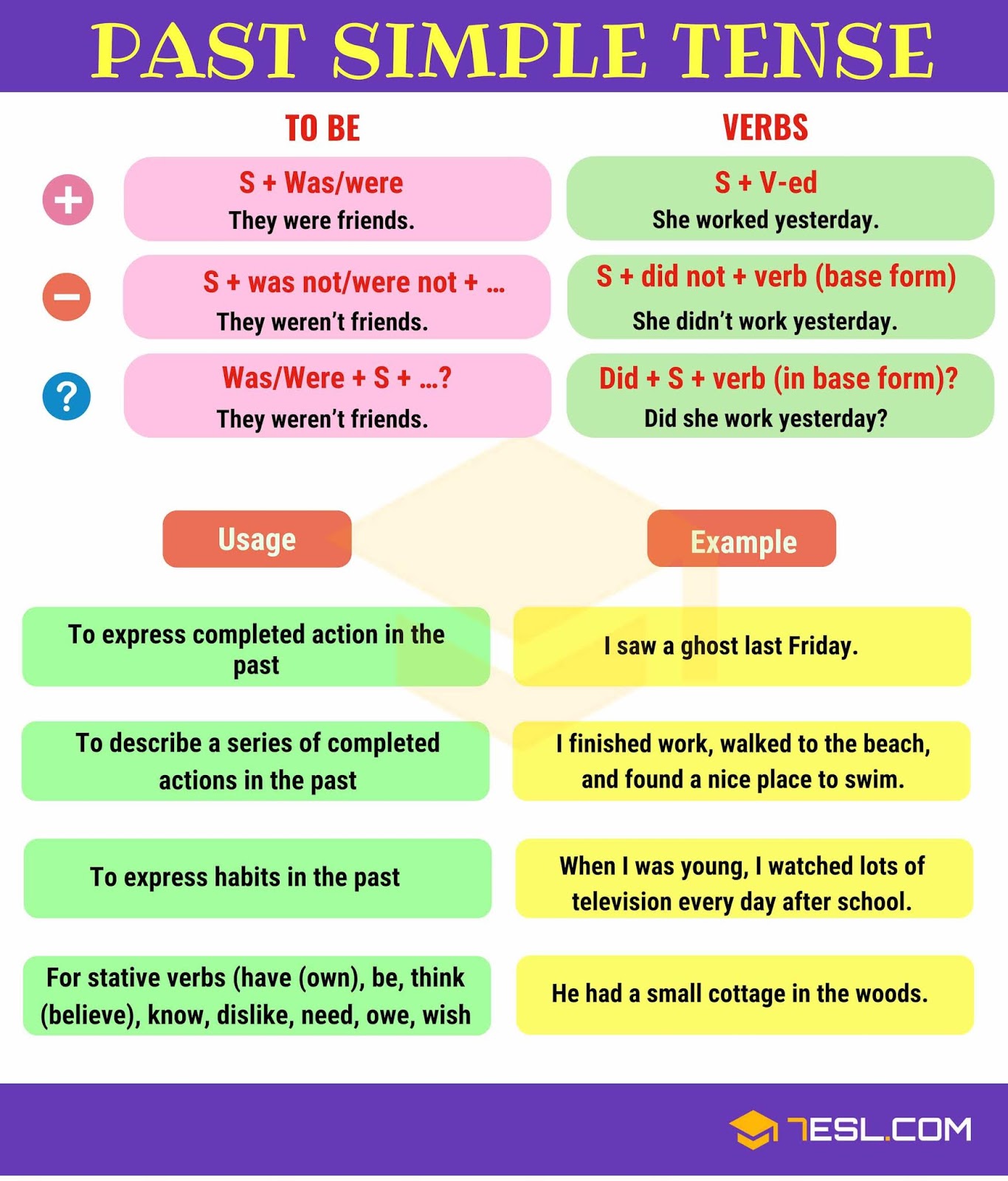
Simple Past Tense
But in other meanings not having to do with birth, "borne" is always the past participle of "bear": "My brother's constant teasing about my green hair was more than could be borne.". The simple past tense of "bear" when no helping verb is involved is of course "bore": "Yesterday my wife bore twins.". The dialectical.

Irregular Verbs A Big List of Irregular Verbs in English»
So Webster's confirms that "born" and "borne" are both born of the same word. When bear means to give birth to, Webster's notes, "the passive past participle in this sense is born when by does not follow.". A baby is born. A passenger is borne. But when followed by the word "by," both take borne. "He was borne by her.".
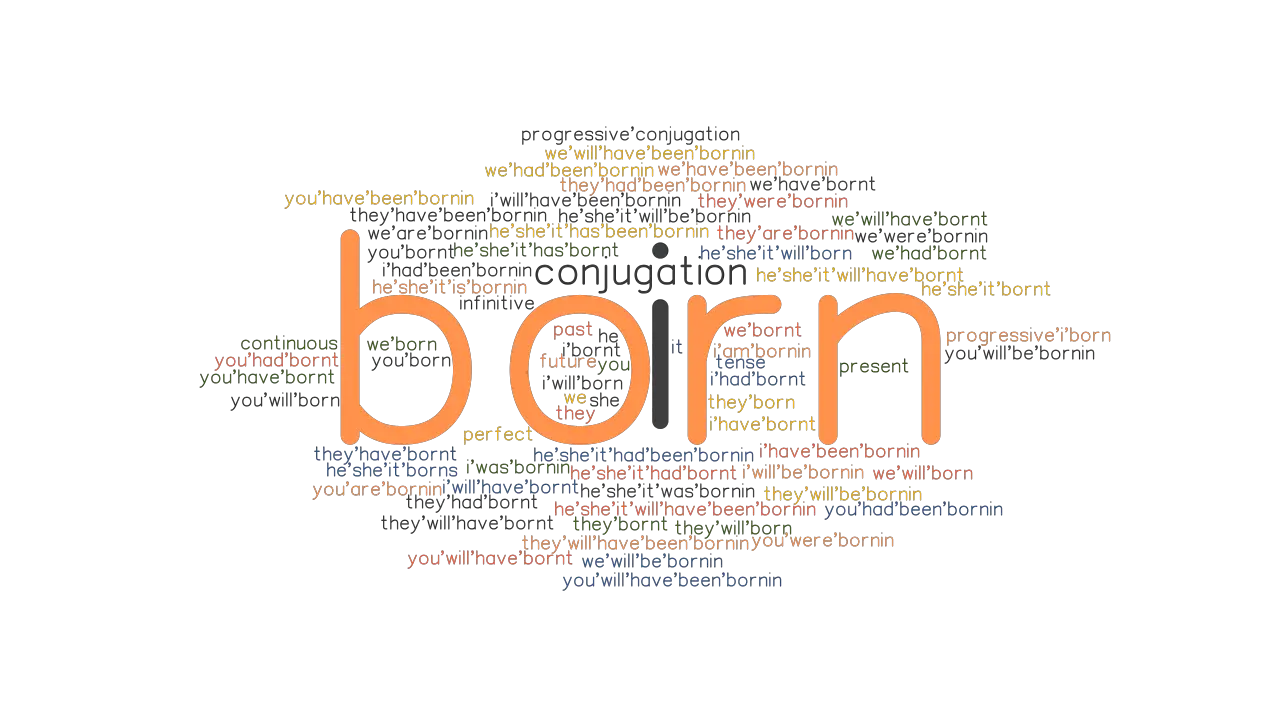
Born Past Tense Verb Forms, Conjugate BORN
Follow-up your lesson on born vs. borne with a multiple-choice quiz. True or false: born and borne are past participles of the same verb. a. True b. False; The past participle born often occurs in _____. a. Active constructions b. Passive constructions c. The past tense d. B and C; The words born and borne are both _____. a. Prepositions b.